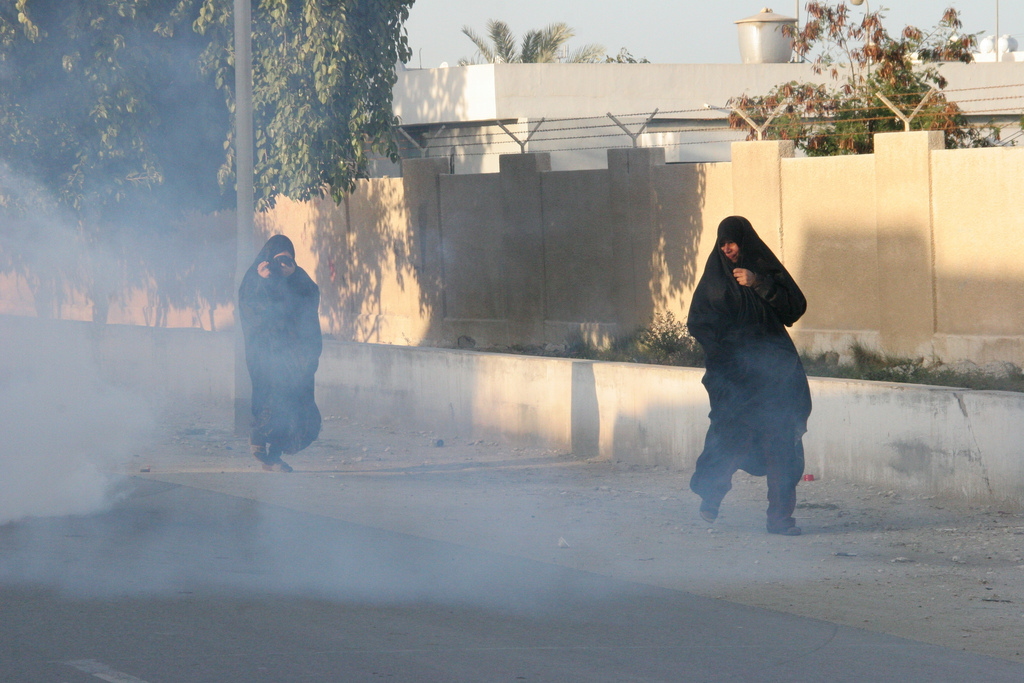20 November 2015 – Allegations that French company Etienne Lacroix had violated human rights provisions of the Organization for Economic Cooperation and Development (OECD) Guidelines for Multinational Organizations merit further investigation, the National Contact Point (NCP) of the OECD in Paris, France announced today. The NCP offered services to Etienne Lacroix and the complainant, Americans for Democracy & Human Rights in Bahrain (ADHRB), in an attempt to mediate the allegations. ADHRB welcomes the NCP’s decision for its decision, and looks forward to fully engaging in the mediation process.
In June, ADHRB submitted a complaint to the French NCP concerning possible violations of the OECD Guidelines committed by Etienne Lecroix. Etienne Lacroix is a French conglomerate that sells riot control weapons and gear to countries in the Persian Gulf. The complaint alleges that Etienne Lacroix, in exporting such weapons to Gulf countries, has directly contributed to human rights violations in the country. The complaint also alleged that Etienne Lacroix did not conduct appropriate due diligence on potential human rights impacts before making the decision to export its weapons through its subsidiary.
In deciding to further examine the issue, the NCP stopped short of stating that Etienne Lacroix had violated the guidelines, but stated that the allegations were “accurate, well-documented and detailed,” and concluded that the questions “deserved thorough analysis.” Both parties accepted the NCP’s offer to mediate the dispute.
“ADHRB is eager to engage Etienne Lacroix on the issue of its weapons exports to the Gulf,” said James Suzano, Acting Director of Advocacy and Legal Affairs at ADHRB. “We hope to come to a conclusion that better protects people of the Gulf from the abusive use of security weapons.”
Gulf countries have a history of abusing riot control weapons to suppress peaceful dissent. In February 2011, simmering political tensions in Bahrain erupted into a peaceful demonstration movement in which one third of Bahrain’s entire native population demanded increased respect for human rights substantial democratic reforms. Authorities responded with lethal force, resulting in 20 deaths, including five from torture in detention. They arrested thousands who participated in, or were suspected of supporting, the demonstrations, and held most detainees in incommunicado detention for weeks, in some cases months.
Both during the 2011 assault on the protest movement and in the five years since, Bahraini authorities have routinely abused riot control weapons, including tear gas and shotguns, to commit human rights violations. Bahraini security forces have extra-judicially killed at least 97 persons and injured thousands of others since suppressing the peaceful protest movement that has swept the country since 2011.
International pressure has in the past had a significant effect on Gulf countries’ ability to obtain access to riot control weapons. In 2014, ADHRB participated in a “Stop the Shipment” campaign after discovering that a South Korean tear gas manufacturer planned to ship 1.7 million tear gas canisters to Bahrain. As a result of the campaign, the South Korean government indefinitely suspended shipments to Bahrain in the face of mounting evidence of systemic abuses, which it found to have resulted in civilian casualties. Earlier this year, the European Parliament also called for an end to European tear gas exports to the country.
“Gulf security agents have used tear gas to injure, maim, and kill civilian protesters for years,” said Husain Abdulla, Executive Director of ADHRB. “As Gulf countries continue to abuse riot control weapons to harm its people, it falls on the manufacturers to deny these countries access to their weapons.”





